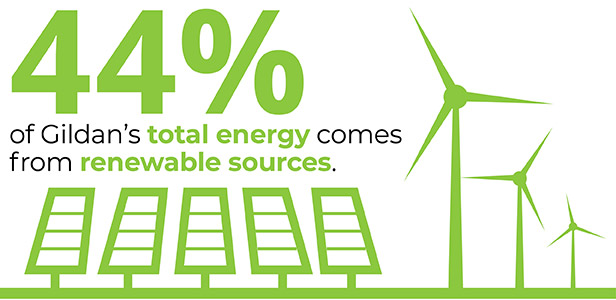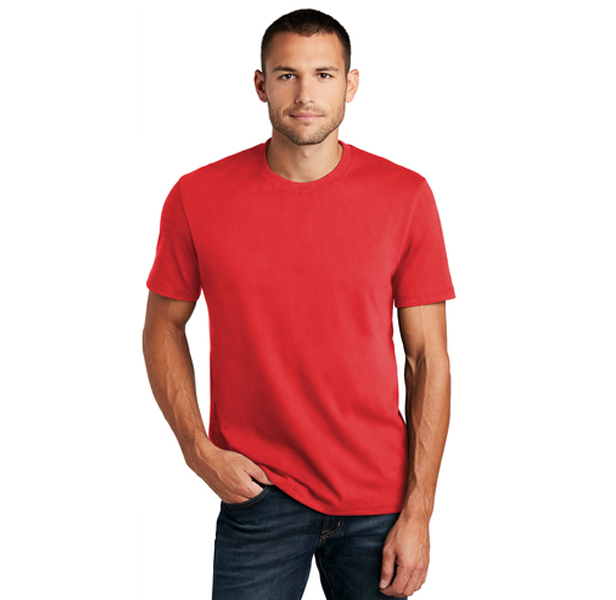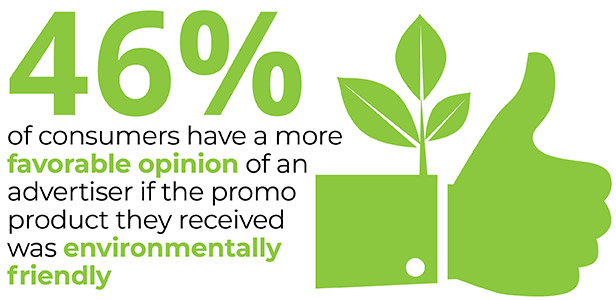Product Hub February 09, 2021
Promo Suppliers Intensify Sustainability Efforts
From a nationwide solar setup to making products from earth-friendlier components, top suppliers are making a visible commitment to lessening their environmental impact.
There’s a green wave rising in the promotional products industry.
Compelled by evolving end-client tastes, a desire to increase efficiency, and a will to reduce the impact of industry on the planet, a growing number of top promo suppliers are ramping up efforts to operate more sustainably.

It’s much more than a trend or even a priority. It’s a tectonic shift occurring within promo and across industries that will fundamentally change and improve production, while also leading to more products being made with earth-friendlier content. Underway for years, the movement is poised to accelerate both in the short- and long-term.
“In the years ahead, people will choose better products made in a sustainable way, not more products,” says Jeremy Lott, president and CEO of Issaquah, WA-based SanMar (asi/84863), the largest supplier in promo.
“Better products work harder for our end-users,” he continues. “They get worn more, make more impressions. Quality, sustainably-made product is a positive for our industry and is here to stay.”
Suppliers have certainly been backing up their promises with measurable gains. It’s a stark contrast to the misuse of terms like “green,” “eco-friendly” and “sustainability” as marketing buzzwords. But what does sustainability really mean?
Under the EPA’s broad definition, it’s conducting activities in a manner that ensures that human impact on the environment is sufficiently mitigated in pursuit of the protection of natural resources and of future generations’ access to water, material, resources, and social and economic requirements.
In a business sense, particularly as it applies to manufacturing and operations, sustainability is creating and/or providing product through economically sound processes that minimize negative environmental impacts. Those actions conserve energy and natural resources and also protect employees, community and consumers.
Suppliers are making these sustainability commitments because they believe they’re the right thing to do – and because consumers are demanding it. The millennial and Gen Z generational cohorts – which are, broadly speaking and taken together, those in their later 30s on down to 10 year-olds – are particularly keen on green.
For instance, a UNiDAYS survey found that 93% of Gen Z members believe that brands have an obligation to take a stand on environmental issues. With estimated buying power of more than $140 billion, that’s a perspective brands ignore at their own peril. “GenZers are passionate about environmental causes,” says Deep Patel, a serial entrepreneur and GenZ member.
S&S Activewear: Make an Imprint
One of the recent headline-grabbing examples of sustainability in promo comes from S&S Activewear (asi/84358), the third largest supplier in the industry. In January, the Illinois-headquartered company announced that it had completed a two-year long project that involved installing solar panels at its six U.S. facilities, which cover about 3.5 million square feet collectively.
Drone footage shows the solar panels on S&S Activewear’s U.S. facilities.
Clean energy generated from the 2,456 high-performance panels will prevent the equivalent of more than four million pounds of CO2 being released into the atmosphere annually, while also powering S&S’s operations. At two of the six locations – in Nevada and Bolingbrook, IL – solar will provide nearly 100% of the energy necessary to run the distribution centers.
The multimillion-dollar project was a monumental undertaking that featured an array of challenges, such as navigating the different restrictions and incentives from each state, municipality and utility where S&S distribution centers are located. It also entailed getting facility landlords on board, not to mention the technical aspects of ensuring that high-quality solar solutions were being installed.
S&S’s solar initiative is part of its broader “Make an Imprint” program, which governs the firm’s corporate, social and environmental efforts for making the communities where it operates better and mitigating deleterious environmental impacts.
S&S leaders, which credit solar firm PurePoint Energy with being an invaluable partner that helped bring the project to fruition, say the effort was well worth it.
“There’s no question that consumers across all end markets expect their supply chains to be more environmentally focused,” says Frank Myers, chief financial and operating officer at S&S. “The brands we partner with are focused on sustainability, as are we. Our company values having fun – and a big part of that is enjoying the outdoors with our friends, families, vendors and customers. As a company, we’re inspired to operate more responsibly and preserve our environment for future generations.”
Gildan: Genuine Responsibility
The fifth-largest supplier by revenue in the North American promo industry, Gildan (asi/56842) has been a longtime leader with environmental initiatives.

(Gildan)
The Montreal-headquartered company’s “Genuine Responsibility” is a social, environmental and governance program that guides how the firm’s apparel is designed, made and sold. For some 16 years, Gildan has implemented specific tools and programs to track its environmental impacts and to ensure its sustainability objectives are met.
The approach has born fruit. In 2020, Gildan ranked 32nd on The Wall Street Journal’s new ranking of the Top 100 Most Sustainably Managed Companies. It was one of only three apparel companies to make the list. Also, for the eighth year running, Gildan made the Dow Jones Sustainability Indices as the only apparel manufacturer included on the North American index.
In December, Gildan was named as a top performer in CDP’s Climate Change Report, earning an A- score that placed the company in CDP’s leadership band for a second consecutive year. CDP is a not-for-profit charity running a global disclosure system for investors, companies, cities, states and regions to manage their environmental impacts.
Minimizing our impacts is our priority, and we always search for new ways to introduce innovative solutions, minimize our waste, and drive energy efficiency in every way we can. Because asking less of the planet means asking more of ourselves. #MakingApparelBetter pic.twitter.com/DkvZDaHLYt
— Gildan (@gildancorp) January 20, 2021
Gildan makes the details of its sustainability progress available annually in publicly available reports and its Genuine Responsibility microsite. For example, in 2019 Gildan decreased its GHG emissions by 10.5% compared with 2018. Also, Gildan reduced its wastewater/effluent intensity (total effluent volume by kg of production) in 2019 by 14% when compared to 2015.
“Our ownership of our facilities and our expertise in making the products we sell allow us to implement leading environmental, social and governance (ESG) practices into every stage of the process,” Gildan says in a statement. “This allows us to improve the impacts we have on our people, their communities and the environment where we operate.”
SanMar: A Canvas for Good
SanMar has been building on sustainability efforts in recent years, something that came into full bloom with the 2019 launch of “Canvas for Good.” The corporate social responsibility initiative details SanMar’s goals, actions and tangible progress in areas that range from ethical sourcing and charitable outreach, to diversity/inclusion and environmental impact.
“The apparel industry has not done a good job of being good stewards of the planet. For our children and grandchildren’s sake, it is critical we change that.” Jeremy Lott, SanMar
Released last month, the latest Canvas for Good report features some exciting achievements on the sustainability front, says Lott. Through mitigation efforts, SanMar has reduced its total energy usage by 7% from 2016 through 2019, while pairing down energy intensity output during the same period by 23%. Similarly, CO2 emissions intensity is down 20% over the four-year span.
A member of the Sustainable Apparel Coalition, SanMar has been making sustainability progress through smart logistics. The company services eight of its 10 distribution centers via intermodal transport (which utilizes methods such as train and ships in addition to trucks), which reduces emissions. The supplier ships domestically with carriers that have green initiatives and/or are SmartWay Partners, an EPA program that helps companies advance supply chain sustainability. Among other conscientious steps, SanMar runs a packing program that batches individual shipments bound for the same destination, thereby reducing the number of trucks picking up from the supplier’s distribution centers each day.
There are product innovations too, like the District Re-Tee and Re-Fleece, which are made entirely from polyester that’s been produced with recycled plastic bottles. SanMar has also been working with supply chain partners to develop new dyeing technology that reduces waste and water use. “In the coming years, we are committed to developing even more want-to-wear products that reduce our impact,” SanMar executives say in the Canvas for Good report.

SanMar’s Re-Tee is 100% recycled fabric and never re-dyed.
SanMar does acknowledge that its water use increased between 2016 and 2019, mostly due to the opening of a new distribution center in Arizona (2017) and expanding a facility in Texas. Still, SanMar is working to reduce water consumption. As just one example: At the new and expanded locations, the company has installed evaporative cooling systems that evaporate water into the air to provide an energy-efficient cooling method. More is in the works, including establishing a baseline water usage on the expanded distribution network that can then be worked against to reduce consumption.
“Through making good on sustainability efforts, we will have product with better quality made in the most efficient way possible,” says Lott, who ranked first in ASI’s 2020 Power 50. “We all share this one small planet and the apparel industry has not done a good job of being good stewards of the planet. For our children and grandchildren’s sake, it is critical we change that.”
Koozie Group: Keep It. Give It.
Formerly known as BIC Graphic and currently the seventh largest supplier in promo, Clearwater, FL-based Koozie Group (asi/40480) announced in January the launch of “Keep It. Give It.” The program is an expansion and greater formalization of the company’s social impact and sustainability commitment. It focuses on areas like diversity/inclusion, safety/social responsibility, environmental stewardship and more.
What does 2021 have in store for the #promoproducts market? Some of the brightest minds in the industry weigh-in, with these 21 predictions for promo's 2021. https://t.co/iSoSCOG6is @ASI_MBell @asicentral @Tim_Andrews_ASI @geigergetsit @alphabroder @epromos
— Chris Ruvo (@ChrisR_ASI) November 12, 2020
ASI Media’s “21 Predictions for Promo in 2021” feature article asserts that the industry will increase sustainability efforts this year. That appears to be happening.
A key component of the eco aspects of the initiative is Koozie Group’s KG Factor, a designation debuted in December that identifies products that lessen environmental impact because they’re kept for a long time (until they break) or gifted. Koozie Group worked with the firm Hanover Research to conduct an impartial end-user survey to identify items in its product portfolio that have the KG Factor. There are currently 510 such products.
“Four out of five people would keep or give a KG Factor product because it was useful, functional, durable and attractive,” says Melissa Ralston, chief marketing officer at Koozie Group. “About 85% of respondents said they would keep these items until they break.”
Going forward, 75% of new products that Koozie Group brings to market will have the KG Factor designation, the supplier asserts. Through design and quality, “By 2024, our goal is to have at least half of our entire product assortment carry the KG Factor,” notes Ralston.
The supplier’s green efforts go well beyond just the designation. They additionally include elements like recycling 83% of waste, making more than 100 products with recycled materials, recycling 4,379 tons of cardboard and paper annually, ensuring 100% of sourced outgoing corrugate packaging is SFI-Certified and made from 100% recyclable and/or recycled materials, and earning the ISO 14001 certification for its facilities in Clearwater and Sleepy Eye, MN, which confirms a business is executing ethical environmental practices on a daily basis.
Alphabroder: The Green Team
Another company that’s upping its eco efforts is alphabroder (asi/34063).
The industry’s second-largest supplier recently announced the launch of “Green Team,” an initiative that includes 20 people from across departments who will work to create what the Trevose, PA-based firm describes as a meaningful and measurable corporate sustainability platform.
“Sustainability is moving from a ‘nice to have’ to a ‘must have.’” Andrea Lara Routzahn, alphabroder
“With Green Team, we aim to enhance and build upon all the good things many of our current brand partners, service providers and supply chain partners are already doing really well, and to help others improve their practices,” says Andrea Lara Routzahn, senior vice president of portfolio and supplier management at alphabroder. “We want to make it easy and informative for our customers to learn more about sustainability and curate our sustainable products and brands. Our goal is to be transparent and honest.”
While announced in January, the Green Team began work the previous May. So far, it’s completed two important phases of work, says Routzahn. The first phase focused on research, education and assessing the current state of the company in terms of sustainability. The second phase entailed learning from the first phase and creating recommendations and action plans for achieving green goals. The particulars are still being discussed among executives, but Routzahn expects there’ll be more details to share in the coming months. “Sustainability is moving from a ‘nice to have’ to a ‘must have,’” says Routzahn. “Corporations and organizations that embrace and communicate their own sustainability initiatives want promotional products that align with their corporate sustainability identity.”
Eco Product Evolution
The intensified energy being devoted to sustainability isn’t just coming from promo’s biggest suppliers. Smaller and mid-sized suppliers are also stitching sustainability into the fabric of their business models.
Take Bagito (asi/37896), for instance. A certified B corporation, meaning the firm meets rigorous standards on social and environmental performance, the Santa Cruz, CA-based supplier’s products, which consist of reusable bags, are made from 100% recycled plastic or 100% organic/non-GMO cotton. Socially conscious, Bagito donates part of every sale to its sister nonprofit Power2Sustain.org, an environmental literacy project aimed at students.

“People can sense that things are changing with our climate and natural world and are thinking more and more about what they can do personally to help,” says Bagito President Mitch Barlas. “I believe that desire to be of service in some small way to help our planet is driving end-users to look for and purchase promotional products that are both made from sustainable materials and are reusable and support sustainability in their daily lives.”
Sustainability is also at the heart of Storm Creek’s (asi/89879) business. The Eagan, MN-based apparel supplier has upgraded 75% of its product line to include recycled materials. The green-focused product innovation is best on display in Storm Creek’s Eco Collection, each piece in which contains at least 35% material that’s been made from recycled plastic bottles. Storm Creek donates 1% of every purchase from the Eco Collection to nonprofits focused on environmental protection through the 1% For the Planet movement.
In this video, Storm Creek explains its commitment to sustainability. The video, released in 2020, mentions that 2.5 million plastic bottles have been deferred from landfills thanks to Storm Creek’s efforts. The number is now about 3 million.
As of this writing, Storm Creek’s eco initiatives had redirected more than 3 million plastic bottles from landfills into useful, attractive garments. Notably, many of the mills from which Storm Creek sources raw materials are Bluesign or Oeko-Tex certified, meaning they follow sustainable practices, including water conservation and using environmentally safe chemicals.
“In grand gestures and in quiet acts,” Storm Creek says, “we strive to do the right thing by our product, our customers, our communities and our planet.”
With the way the world is changing, there’s a growing likelihood that companies that fail to do the same will start to fall behind.

Product Hub
Find the latest in quality products, must-know trends and fresh ideas for upcoming end-buyer campaigns.
